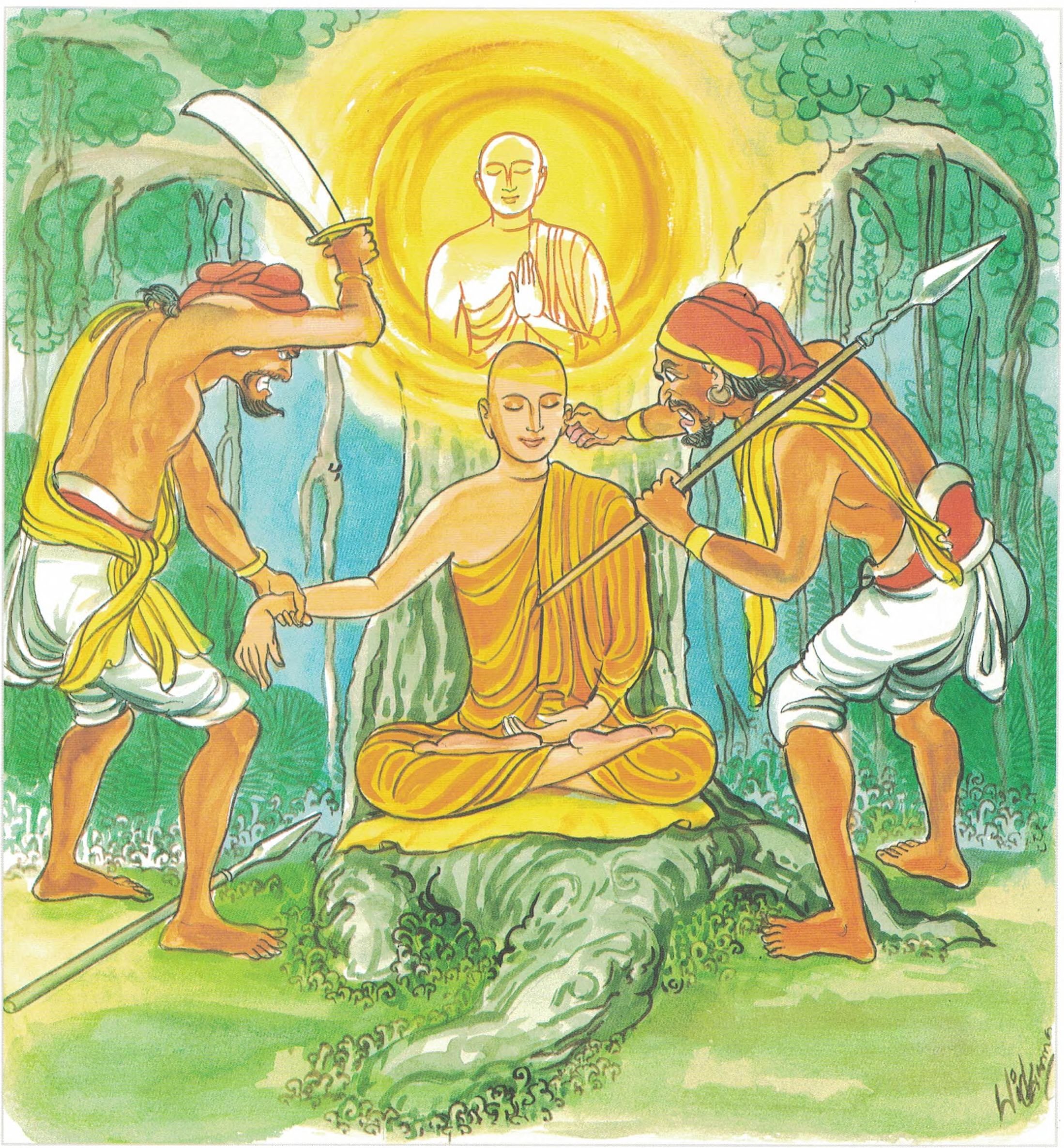Dhammapada (Illustrated)
by Ven. Weagoda Sarada Maha Thero | 1993 | 341,201 words | ISBN-10: 9810049382 | ISBN-13: 9789810049386
This page describes The Story of the Patient Subduing the Insolent which is verse 399 of the English translation of the Dhammapada which forms a part of the Sutta Pitaka of the Buddhist canon of literature. Presenting the fundamental basics of the Buddhist way of life, the Dhammapada is a collection of 423 stanzas. This verse 399 is part of the Brāhmaṇa Vagga (The Brāhmaṇa) and the moral of the story is “Unaffected he bears up abuse and beating, backed by patience, him I call a true brahmin”.
Verse 399 - The Story of the Patient Subduing the Insolent
Pali text, illustration and English translation of Dhammapada verse 399:
akkosaṃ vadhabandhaṃ ca aduṭṭho yo titikkhati |
khantibalaṃ balānīkaṃ tamahaṃ brūmi brāhmaṇaṃ || 399 ||
399. Who angerless endures abuse, beating and imprisonment, with patience’s power, an armed might: that one I call a Brahmin True.
 Unaffected he bears up abuse and beating, backed by patience, him I call a true brahmin. |
The Story of the Patient Subduing the Insolent
This religious instruction was given by the Buddha while He was in residence at Veluvana, with reference to Akkosa Bhāradvāja.
For Akkosa Bhāradvāja had a brother named Bhāradvāja, and a wife named Dhananjānī, who had attained the fruit of conversion. Whenever she sneezed or coughed or stumbled, she would breathe forth the solemn utterance, “Praise be to Him that is highly exalted, all-worthy, supremely enlightened!” One day, while distribution of food to Brāhmans was in progress, she stumbled, and immediately breathed forth that solemn utterance as usual with a loud voice.
The Brāhman was greatly angered and said to himself, “No matter where it may be, whenever this vile woman stumbles, she utters the praise of this shaveling monkling in this fashion.” And he said to her, “Now, vile woman, I will go and worst that Teacher of yours in an argument.” His wife replied, “By all means go, Brāhman; I have never seen the man who could worst the Buddha in an argument. Nevertheless, go ask the Buddha a question.”
The Brāhman went to the Buddha and, without even saluting him, stood on one side and asked Him a question, pronouncing the following Stanza,
What must one destroy to live at ease? What must one destroy no more to sorrow?
Of what single condition do you recommend the destruction, Gotama?
In answer, the Buddha pronounced the following Stanza,
Let a man destroy anger, and he will live at ease; let him destroy anger, and he will no more sorrow.
Poisonous is the root of anger, and sweet is the top, brāhman.
Therefore the noble applaud the destruction of anger,
for when this is destroyed, there is no more sorrow.
The brāhman believed in the Buddha, retired from the world, and attained arahatship.
Now his younger brother, who was called Akkosa Bhāradvāja, heard the report, “Your brother has retired from the world,” and greatly angered thereat, went and abused the Buddha with wicked, ugly words. But the Buddha subdued him too by employing the illustration of the hard food given to strangers, and he too believed in the Buddha, retired from the world, and attained arahatship. Likewise Akkosa Bhāradvāja’s two younger brothers, Sundarī Bhāradvāja and Bilaṅgika Bhāradvaja, abused the Buddha, but the Buddha subdued them, and they too retired from the world and attained arahatship.
One day in the hall of truth the monks began the following discussion: “How wonderful are the virtues of the Buddhas! Although these four brothers abused the Buddha, the Buddha, without so much as saying a word, became their refuge.” At that moment the Buddha drew near. “Monks,” said He, “what is the subject that engages your attention now as you sit here all gathered together?” “Such and such,” replied the monks. Then said the Buddha, “Monks, because I possess the power of patience, because I am without sin among the sinful, therefore am I of a truth the refuge of the multitude.”
Explanatory Translation (Verse 399)
yo akkosaṃ vadhabandhaṃ ca aduṭṭho titikkhati
khantībalaṃ balāṇīkaṃ taṃ ahaṃ brāhmaṇaṃ brūmi
yo: if some person; akkosaṃ [akkosa]: abuse; vadhabandhaṃ ca: torture, imprisonment; aduṭṭho titikkhati: endures without losing one’s temper; khantībalaṃ [khantībala]: (who) has patience as his power; balāṇīkaṃ [balāṇīka]: and his army; taṃ: him; ahaṃ: I; brāhmaṇaṃ [brāhmaṇa]: a brāhmin; brūmi: call
He is abused and insulted. He is tortured, imprisoned and bound up. But he endures all these without being provoked or without losing his temper. Such an individual who has patience as his power and his army I describe as a true brāhmaṇo.
